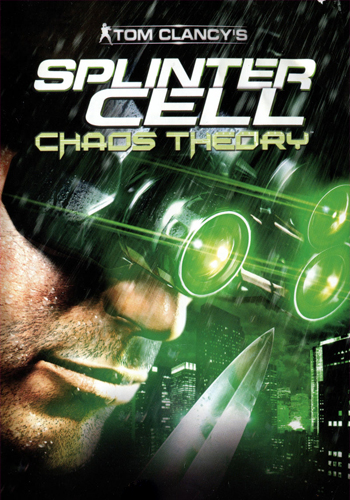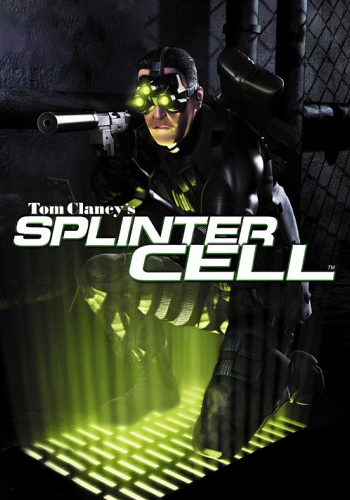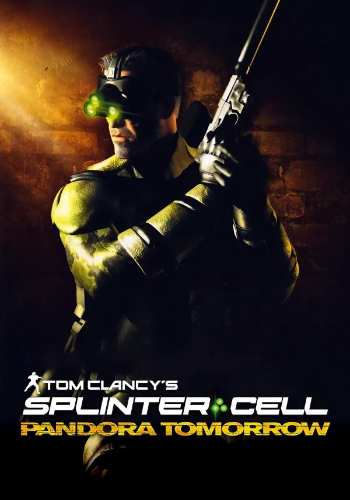Tom Clancy’s Splinter Cell: Chaos Theory

-
Information
-
Original Soundtrack
Unexpected
But not only the gameplay of Chaos Theory was convincing. The game was the first (and to my knowledge only) score in the series to be given a proper original soundtrack. According to the Splinter Cell-wiki , Ubisoft was so impressed by the work of Brazilian musician Amon Tobin that they released the score a few months before the game's release - and rightly so!
As I mentioned with the first Splinter Cell and Pandora Tomorrow , their scores were quite okay, but were subject to the curse of the gamerip, for example in the form of maximum lengths of the individual songs, due to the division into sneak and shoot pieces. Even though Tobin's works are divided into individual sequences in the actual game, they remained in one piece in the finished OST. The result is the first score that can really be called a Splinter Cell-album. But what does it sound like now?
To describe the ten songs in technical terms, I'll quote briefly from the Splinter Cell-wiki:
This album showcased the beginning Tobin's shift from collecting samples from vinyl records to recording his own samples. For the recording of Splinter Cell: Chaos Theory – Splinter Cell 3 Soundtrack, Tobin hired a live band whose members ranged from Mexican composer Nacho Mendez to Japanese flutist Eiji Miyake. Seminal composer Jesper Kyd was also hired to score the games cinematics.
Samples, Mexican composers and Japanese flutes - sounds like a wild combination. And it is! But in the best sense. This becomes clear from the very first track and my personal highlight of this score: The Lighthouse. Not only did this track make it into my very first Top 100 Video game tracks , but it also perfectly demonstrates Tobin's creative fusion of different styles with secret agent DNA.
From the outside, The Lighthouse has a very simple structure. As in a theater performance, musical actors come to the fore, dominate what you hear for a brief moment and then make way for something new. At the end of the five minutes, you wouldn't believe that it's still the restrained piece from the beginning if it weren't for the melody on the guitar that accompanies us throughout, with the exception of a few breaks ... but I'm getting ahead of myself.
It starts with a violin that dramatically repeats a note. Individual sounds screech behind it - is this a horror game? The hairs on the back of your neck stand up until suddenly this electric guitar (or bass?) kicks in. Durudum dum dum didadudum ... a simple sequence of notes, a simple sample running along and pushing us forward. The melody continues, sometimes distorted, then slightly altered, but the guitar remains, progressing unperturbed, while musical chaos rages around it. Is this a sonar? Can we hear something from the previous Splinter Cells? No idea, but it fits!
The background noise gets louder, shriller. The disharmonies start and suddenly the drums break out - we are fighting for survival. It all seems so anarchic, but of course it makes sense in the context of the game and divided into the different phases of gameplay (sneaking vs. shooting). Nevertheless, it works just as well cohesively - or perhaps even better. The track doesn't give us a moment's peace, only lets us catch our breath for a few seconds and then fades out unexpectedly.
You can just tell that it's no longer the Pandora Tomorrow-crew at work, but a DJ from the electro scene who has been unleashed on the genre of the agent thriller. Normally, that wouldn't be my cup of tea. Others like the funky, fresh music of Jet Set Radios , for example, or the psychedelic repetition of a Moby song. And of course there are also tracks that don't blow me away as much (The Clean Up). However, as the album comes with just ten tracks - eleven if you include the bonus track Stolen - a lighthouse (so to speak) like The Lighthouse carries more weight.
To summarize: although Chaos Theory is a refinement of its predecessors in terms of gameplay, musically it can probably be described as experimental. An experiment that is definitely worth a listen - especially because you wouldn't expect it from a series like Splinter Cell .
Nostalgia warning
-
Original Soundtrack




